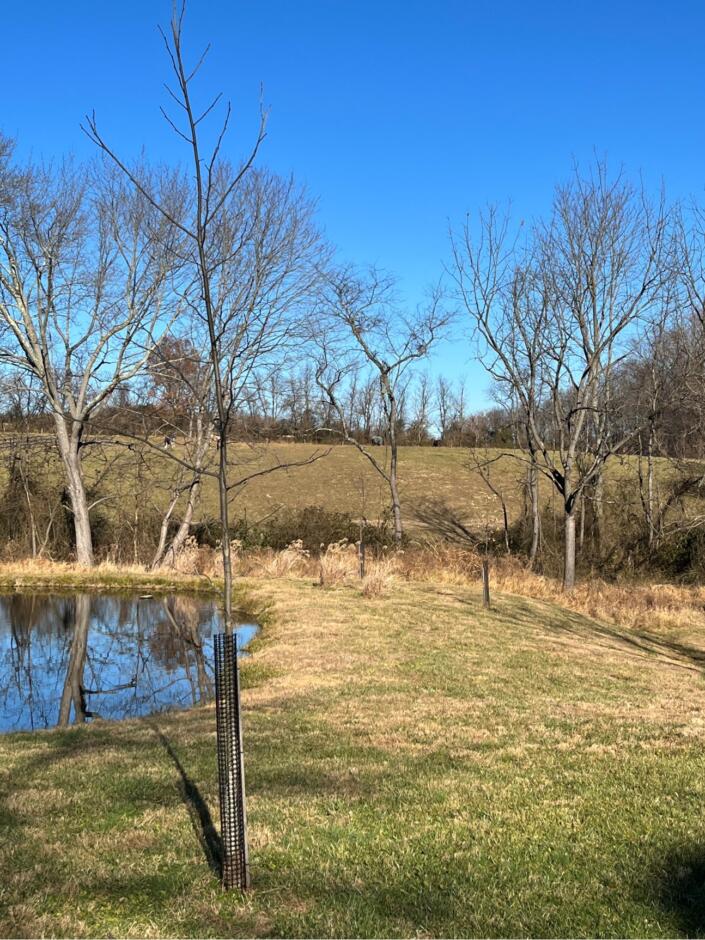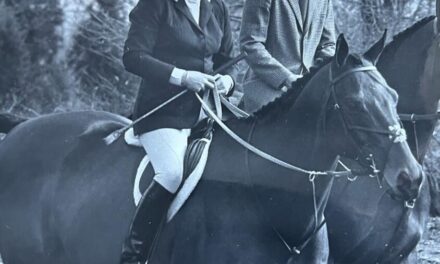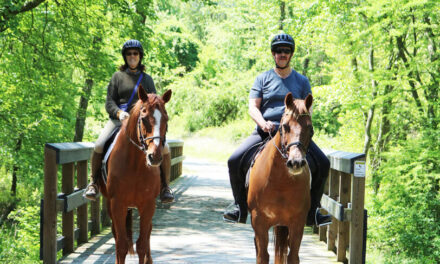Spotlight on Conservation: Fine Idea Farm
by Jane Thery, MHC Farm Stewardship Committee Chair (first published in the March 2022 Equiery)
In the December 2021 issue of The Equiery, we highlighted Maryland Horse Council-member Abby Gibbon’s Fine Idea Farm for being named Conservation Farm of the Year by the Howard County Soil Conservation District. This month, we look at the conservation practices in place at Fine Idea Farm that won them this award and, more importantly, how they create a healthy farm for horses, people, and the land itself.
Fine Idea Farm in Mt. Airy, sits on roughly 60-acres and is home to 24 horses, primarily eventing and dressage horses. The farm is is protected by a perpetual Agricultural Land Preservation Easement through Howard County. Gibbon serves on the Howard County Agricultural Preservation Board.
There are two barns on the farm, one older bank barn with a new roof and four new stalls, and a newer center aisle barn with 15 stalls. The pastures enclose 25 acres that are divided into four fields and a loafing paddock with run-in sheds. In addition, there is an indoor arena, an outdoor arena, round pen, several small out buildings, and the farm house. The property also produces its own hay.
Water management should always be at the top of a farm owner’s list of best practices and Fine Idea Farm’s hilly terrain with natural springs, a pond and stream make it easily susceptible to run-off. Gibbon reported that when she first moved to the property, the lanes to get horses in and out of pastures were often deep with mud. To solve this issue, Gibbon used a cost-sharing grant from the Natural Resources Conservation Service of the U.S. Department of Agriculture to create blue-stone and gravel pathways around the fields. These pathways become both a riding surface and a drainage area.
“The paths are a lifesaver for both us people and our horses,” Gibbon said. “It is much easier for us to get horses in and out without slipping in mud and our horses’ feet are so much healthier since they are no longer walking through mud.” Gibbon added that her contact at USDA was Charlotte Brewster, who was very helpful in assisting with the cost share grant process.
Gibbon also used a cost sharing grant from the Howard County Soil Conservation District to install automatic waterers in all her pastures. “This also improves life for me as a farm owner, my staff ,and our horses,” Gibbon reported. “We don’t have to worry if water troughs are frozen anymore and save time breaking ice in the winter. Plus the horses love them! They have cool clean drinking water all the time.”
To help control water run-off, Gibbon also used a mix of gravel and recycled concrete for her driveway and other roadways within the farm. “The recycled concrete mix creates a harder surface than just gravel so the water drains off the driveway,” she explained.
Gibbon had the pasture soil tested with assistance from the University of Maryland Extension Office and created a Nutrient Management Plan to maintain better grass coverage and to slow down and absorb rainwater. The stream is fenced off from horse pastures and the stream banks are held in place by a good cover of vegetation. The farm also has old growth trees and wooded areas around the stream that not only provide wildlife habitat but also become good carbon fixers. New trees were recently planted with assistance of the Howard County Turf to Trees program to create a buffer from the neighboring housing development.
Part of the farm’s Nutrient Management Plan includes hauling off manure instead of composting or spreading at the farm. “We could spread [manure] here but you have to go through a lot of hoops due to the Nutrient Management Plan,” Gibbon stated. “I know there is a lot of talk out there about composting, and I hope better manure management ideas come up in our area as hauling out manure is very expensive.” Gibbon estimates that she pays $1,000 per month during the winter to haul off manure.
The conservation practices of Fine Idea Farm also include energy conservation that is enhanced by the natural light and ventilation in the new barn, the older bank barn’s natural warmth in the winter and coolness in the summer, and new LED lights in the feed room. Gibbon is also looking into adding a solar panel system to the farm.
Recycled material is used as the footing in both arenas at Fine Idea Farm. Purchased and installed through King Sport Construction, which Gibbon discovered through an ad in The Equiery, the footing at the farm is a combination of recycled rubber and artificial turf. The Mt. Airy-based company primarily renovates athletic fields and processes the material in the base of old fields to create riding arena footing. “It is very affordable and easy to maintain,” Gibbon said. “Plus the fact that Kings is local cuts the cost of shipping significantly.”
Fine Idea Farm has demonstrated that a commitment to conservation and farm stewardship can result in a healthy farm, healthy horses… and healthy people! “Doing these things is not just for the environment, but for us and our horses. The positive impact it has had on my business is tremendous,” she said. “I highly recommend that farm owners start by contacting their county Soil Conservation Districts and make a plan to have their own farms be environmentally proactive.”













